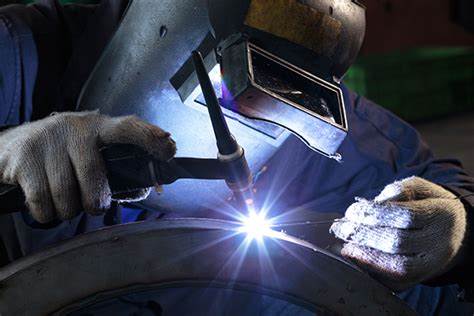Introduction
How to Become a Welder in India: Becoming a welder in India offers an exciting career path with numerous opportunities for growth and job satisfaction. In many fields, including manufacturing and construction, welding is a critical skill. In this article, we will guide you through the steps to become a skilled welder in India.
Table of Contents
Understanding the Welding Profession
What is Welding?
Welding is a process of joining materials, typically metals, by melting the base materials and adding a filler material. It creates a strong bond between the materials, resulting in a cohesive structure.
Importance of Welding in Industries
Welding plays a crucial role in various industries such as construction, manufacturing, and even art. It’s used to create everything from towering skyscrapers to delicate sculptures.
Skills Required for Welding
Manual Dexterity
Welders need excellent hand-eye coordination and precise control to create accurate and clean welds.
Attention to Detail
Paying attention to small details ensures the quality and integrity of the welded joints.
Technical Aptitude
Understanding the different welding techniques and equipment is essential for a successful welding career.
Educational Pathways
ITI Welding Courses
Industrial Training Institutes (ITIs) offer short-term welding courses that provide basic skills and knowledge.
Diploma in Welding Technology
A diploma program in welding technology offers a more in-depth understanding of welding techniques and materials.
Bachelor’s Degree in Welding Engineering
For a comprehensive education, consider pursuing a bachelor’s degree in welding engineering, which covers advanced concepts and engineering principles.
Apprenticeship Programs
Gaining Hands-on Experience
Apprenticeships provide the opportunity to learn from experienced welders and gain practical skills.
Learning from Industry Experts
Working alongside professionals allows apprentices to grasp the nuances of welding techniques that aren’t taught in classrooms.
Certifications and Licenses
Welder Qualification Tests
Certification tests ensure that you possess the necessary skills to produce high-quality welds.
Certified Welder Program
Achieving certification through programs like the Certified Welder Program enhances your credibility and job prospects.
Types of Welding Techniques
Arc Welding
Arc welding uses electricity to create an electric arc between the base material and the electrode, melting the metals and forming a strong bond.
MIG and TIG Welding
Metal Inert Gas (MIG) and Tungsten Inert Gas (TIG) welding are versatile methods that offer precise control over the welding process.
Flux-Cored Welding
This technique uses a flux-cored wire to shield the weld pool from contaminants, making it suitable for outdoor work.
Safety Measures in Welding
Protective Gear
Welders must wear appropriate clothing and safety gear to shield themselves from sparks, heat, and harmful fumes.
Ventilation and Work Environment
Proper ventilation is crucial to prevent exposure to welding fumes, which can be hazardous to health.
Job Opportunities for Welders
Construction Industry
Welders are in demand for constructing buildings, bridges, and infrastructure projects.
Automotive Sector
The automotive industry requires welders for manufacturing and repairing vehicle components.
Shipbuilding and Aerospace
Precision welding is vital in shipbuilding and aerospace industries to ensure structural integrity.
Building a Welding Portfolio
Showcasing Your Work
Creating a portfolio of your projects demonstrates your skills to potential employers and clients.
Networking within the Industry
Building connections with professionals in the welding industry can open doors to job opportunities.
Continuing Education
Staying Updated with New Techniques
Welding technology evolves; staying updated with the latest techniques enhances your skillset.
Attending Workshops and Seminars
Participating in workshops and seminars provides hands-on experience with new equipment and methods.
Career Progression
Welder to Supervisor
With experience, welders can advance to supervisory roles, overseeing projects and teams.
Quality Control and Inspection
Specializing in quality control ensures that welded products meet industry standards.
Challenges Faced by Welders
Physical Demands
Welding can be physically demanding, requiring strength and stamina to work in various positions.
Worksite Conditions
Welders often work in challenging environments, adapting to different worksite conditions.
Future Trends in Welding
Automation in Welding
Advancements in automation are changing welding processes, requiring welders to adapt to new technologies.
Sustainable Welding Practices
The industry is moving towards eco-friendly practices, creating a demand for welders skilled in sustainable methods.
Financial Outlook
Entry-Level Salary Expectations
Entry-level welders can expect a modest salary, which increases with experience and expertise.
Income Growth with Experience
As you gain proficiency and work on diverse projects, your earning potential grows.
Conclusion
Becoming a welder in India offers a fulfilling career journey with opportunities for growth and innovation. By following the outlined steps, you can embark on a path that leads to a successful and rewarding welding career.
FAQs
Q1- Is a degree necessary to become a welder in India?
A- While a degree is not mandatory, it can provide advanced knowledge and better career prospects.
Q2- What safety precautions should welders take?
A- Welders should wear protective gear, work in well-ventilated areas, and follow safety guidelines.
Q3- What are some common welding techniques?
A- Common techniques include arc welding, MIG welding, TIG welding, and flux-cored welding.
Q4- How can I find apprenticeship opportunities?
A- Look for openings in welding companies, workshops, and vocational schools.
Q5- What is the future of welding in terms of technology?
A- The future holds increased automation and a focus on sustainable, eco-friendly practices.




